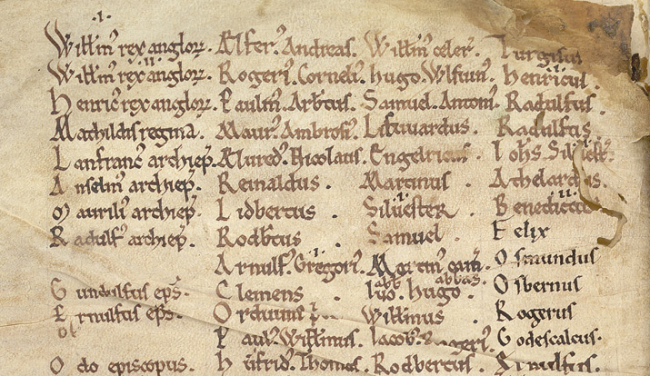http://www.medievalists.net/2014/04/14/database-uk-surnames-reached-45000-entries-dating-back-middle-ages/?utm_content=buffere6e6e&utm_medium=social&utm_source=twitter.com&utm_campaign=buffer
The ‘Family Names of the United Kingdom Project’, which is being carried out by a team at University of the West of England – Bristol, has reached a key milestone with the completion of the first phase of the database with 45,000 surnames researched and explained. The full dictionary of surnames is due to be published by Oxford University Press in 2016.
Professor Patrick Hanks and Professor Richard Coates have led a team of researchers which includes historical linguists, medieval historians, lexicographers and expert advisers on Irish, Scottish, Welsh, and recent immigrant names. The team analysed records from published and unpublished sources dating from the 11th to the 19th century to enable new and detailed explanations of names to be provided, which will be more reliable and up to date than those currently available. Each entry includes the frequency of the name, its main location, origins and references to documents in The National Archive, Parish Registers, and other sources, illustrating early occurrences of the name.
Professor Richard Coates explained, “There is widespread interest in family names and their history. Our research uses the most up-to-date evidence and techniques in order to create a more detailed and accurate resource than those currently available. We have paid particular attention, wherever possible, to linking family names to locations. Surnames are part of our identity, so most people are interested in knowing about their names. My main interest is in the linguistic side, in the language of origin and the original meaning of the names, but this research is interdisciplinary, drawing also on history, family history, place-name study, geography and official statistics.”
Professor Patrick Hanks added, “We very much hope that our database will be used in schools as well as by genealogists and the general public. I have found that by studying the origins of their own name and those of their classmates, children can be inspired to want to find out more about language and history in general.”
Surnames covered in the research range from the very common to less well-known names with unusual origins.
The colourful name of Threadgold, with 730 bearers has its origins in the old English words for ‘thread’ and ‘gold’ for an embroiderer who used golden thread. It was first recorded in 1166 and now has numerous variants including the Norfolk name Trudgill. Most English surnames have several variant spellings. The Family Names project has tracked these down and explained them.
A far more common name, Parkin (Perkin, Parkyn, Parken, Perkins) first recorded in 1309, derives from Middle English Pere(s), from Norman French P(i)ere(s). The name has a wide geographical spread across Great Britain with 12,220 bearers of the name. Parkin is also the name of a popular cake common in Northern England.
One of those bearers is PhD student Harry Parkin, who was one of the team working on the project. Harry says, “It has been a fascinating project to work on. Drawing on linguistic and historical expertise we have been able to track and record the origins of many unusual and common names. Knowing the origins of my own name, gives me a sense of being connected to those other people in the past, even if we are not directly related. I think when it becomes available this database will be an interesting addition to the tools out there for genealogists, family historians, historical linguists, and anyone interested in learning more about their family name”.
The study included not only names of English and Scots origin but also names of Irish, Gaelic, Welsh, and Cornish origin as well as Huguenot and Jewish. Special procedures were developed to study recent immigrant names (i.e. those appearing after 1881) such as Indian, Chinese and a range of Muslim names, with the cooperation of overseas consultants.
The main product of the research will be a database accessible like an online dictionary, to be published by Oxford University Press in 2016, who also intend to publish it in book form. Each entry has separate fields which include: the meaning of the surname, the linguistic origin, the geographical origin, the distribution at the time of the 1881 census, and the modern numbers and distribution.
In January 2014, AHRC awarded UWE a further grant to continue the project so that surnames in the UK with more than 20 current bearers (instead of the present 100) could be included.
Source: UWE Bristol

No comments:
Post a Comment